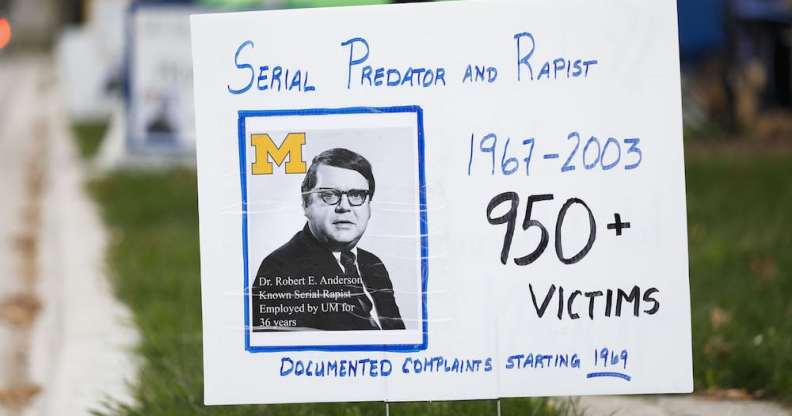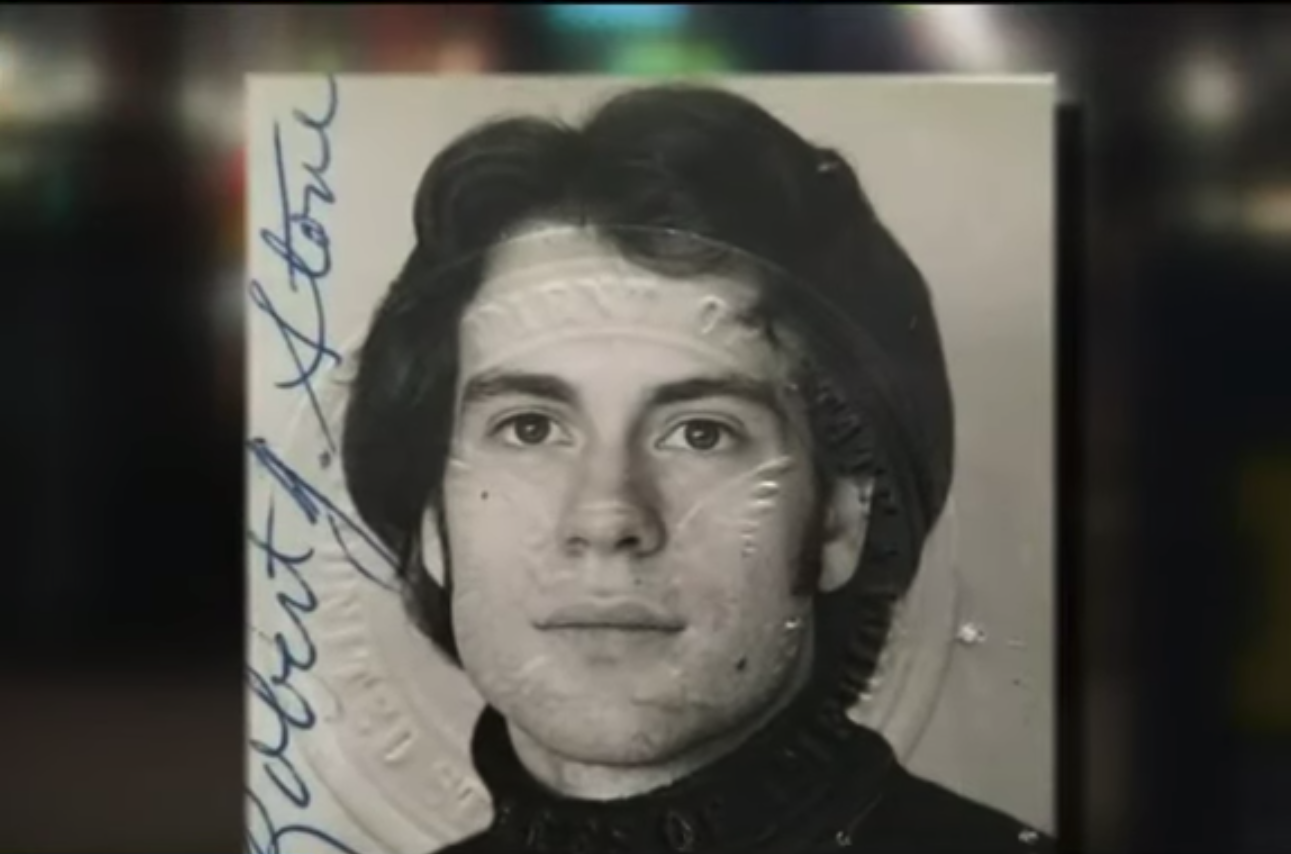University of Michigan to pay monster doctor’s sexual abuse victims $500m amid ‘cover-up’ claim

A vigil in 2021 for survivors of sexual abuse by Robert Anderson. (Getty/ Bill Pugliano)
The University of Michigan will pay almost $500 million to more than 1,000 former students sexually abused by a school doctor.
The $490 settlement settlement was announced hours after a press conference saw survivors of Dr Robert Anderson’s abuse describe the university as a “little mafia” with a “long history of covering up his crimes”.
Next month will mark two years since survivors of Anderson’s abuse, carried out during examinations by the university athletics doctor, came forward publicly with their stories.
Anderson, a University of Michigan graduate, was hired by the university as a physician in September 1966, and by 1967 was the doctor for the university’s athletic department. He was promoted a year later to director of University Health Services.
Anderson remained a doctor at the university until his retirement in 2003. He died in 2008.
In February 2020, Robert Stone, who was a student at the University of Michigan in the 1970s, became the first of Anderson’s victims to go public with his story. At the same time, the university revealed that since July 2018 it had been investigating multiple reports of “sexual misconduct and unnecessary medical exams” by Anderson’s former patients.
The university also set up a hotline for other victims to come forward, and in 2020 alone it received more than 2,100 complaints of sexual abuse by Anderson during his decades-long career, including 1,194 reports of on-campus rape.

Robert Julian Stone was a student at the University of Michigan in the 1970s. (WDIV Local 4/ YouTube)
Robert Anderson victim Robert Stone: ’50 years later, I’m still carrying this anger’
Warning: Descriptions of sexual assault
Speaking to publications including PinkNews, Robert Stone recalled: “In 1971, at the end of my junior year, I was just coming out as a gay man. And I was told that I might have been exposed to a sexually transmitted disease and I should see a physician.”
That physician would turn out to be Robert Anderson.
“I was sexually assaulted in the in the course of that examination,” he said. Stone has previously described how during the examination, Anderson began undressing and placed the 20-year-old student’s hand on his genitals.
Stone continued: “Dr Anderson was a troll. He was just a disgusting human being. And what he put us through was so traumatising.
“I remember when I walked out of that exam room, I was so disgusted. And I was so angry. And I’m still angry. Fifty years later, I’m still carrying this anger.”
Despite the settlement reached with survivors, the University of Michigan is still facing calls to take responsibility for its role in the abuse that continued for more than three decades.
Last year, it commissioned law firm WilmerHale to complete an independent investigation into the abuse allegations.
The report was damning, and found that multiple staff members at the university were aware of the ongoing abuse by Anderson, and did nothing to stop it.
In 1975, Tad DeLuca, a member of the university’s wrestling team who “received at least five rectal examinations from Dr Anderson while seeking treatment for ailments such as a dislocated elbow and cold sores on his face”, wrote a letter to his wrestling coach, Bill Johannesen.
In the letter, he wrote: “Something is wrong with Dr Anderson. Regardless of what you were there for, he asks that you ‘drop your drawers’ and cough.”

Tad DeLuca, a former University of Michigan wrestler, holds a press conference outside Michigan Stadium on the University of Michigan campus in 2021. (Getty. Bill Pugliano)
Between 1979 and 1981, Thomas Easthope, the associate vice president of student services, and who oversaw the university health services, received specific complaints about sexual misconduct by Anderson on at least three separate occasions.
According to WilmerHale’s report, Easthope “was told directly and explicitly about Dr Anderson’s misconduct and failed to take proper action to address it”.
Multiple staff members in the university’s health service said they were aware of complaints about Anderson, including physicians, secretaries and volunteers, and the report also identified eight separate occasions when student athletes raised concerns with staff in the athletics department.
While there were “persistent and widespread rumours” about Anderson’s sexual abuse of students throughout his career, staff did not see this as a “cause for concern”, and the report found “no evidence that anyone inquired into his conduct or referred him for investigation”.
The University of Michigan has refused to agree to full cooperation and transparency in an investigation
In March, 2020, Michigan’s attorney general Dana Nessel said she would only open an investigation into sexual abuse by Robert Anderson if the University of Michigan would commit to full transparency and cooperation. The university refused.
Robert Stone recalls at the time describing the situation as a “horror story”.
This week, he said: “It is a horror story if you know the details. But because the university is withholding all of the details of what went on in those exam rooms, you don’t know that Dr Anderson, in 2000, was actually taking the electrodes that chiropractors often used for muscular stimulation… He was using those electrodes attaching them to his patient’s penis, and also attaching them to his own penis, and simultaneously stimulating them both to erection and then to orgasm.
“This is a Dr Frankenstein. And these are the kinds of things that went on that you don’t know about. Because the university would not commit to transparency. And the victims are so ashamed and so damaged, that they can’t talk about them.
“I’m not pleased to be bringing you these stories. But you need to know.”
Keith Moree, of the University of Michigan class of 1981 and another survivor of Anderson’s abuse, told publications including PinkNews: “The University of Michigan has such a long history of covering up for Dr Anderson’s crimes.
“Let’s remember, what we’re talking about here are crimes that university officials knew about and never reported to the police, to the state medical board, or to anyone else in a position to investigate and potentially prosecute.
“That same university has consistently refused to take full responsibility for what occurred.
“The WilmerHale report said that dozens of University of Michigan employees were alerted through the decades to the actions of Robert Anderson. That same university has consistently diminished the gravity of the harm that was done to its students.
“The university has long shown more concern and care for its brand than for the well being of its students. The University of Michigan has clearly demonstrated that it wants to do the minimum possible so that it can get out of the mess that it’s made, not to do the right thing.”
Robert Anderson got away with his crimes for so long because of ‘tenure and toxic masculinity’, said Robert Stone
Survivor Robert Stone said he had thought for a long time about what “allowed this to happen for over 30 years”. His conclusion: “Tenure and toxic masculinity.”
Academic tenure, or as Stone described it “the little mafia called tenure at the University of Michigan”, is an indefinite academic appointment which can only be terminated in extreme circumstances. At the University of Michigan, it is the “glue that holds this cesspool together”, Stone said.
Anderson was a tenured member of staff, and Stone added: “It bears much of the blame for the university’s failure to act against Dr Anderson, because when malfeasance is detected among tenured staff, no one will speak up or call it out, because no one wants to punch a hole in the boat that’s keeping them all afloat.”
“The second thing I want to talk about is toxic masculinity,” said Stone.
“What’s been happening is that people who are victims of Dr Anderson, many of them are afraid to speak at all. They don’t want to come forward because they’re traumatised, because they feel some guilt, which is completely inappropriate. They had nothing to do with being sexually molested, they just showed up in an exam room.
“But the coaches turned a deaf ear to it. Their definition of masculinity is that if you’re sexually assaulted, you just stuff it down, and you keep on, you go back to the playing field, you stand on the scrimmage line, and you just man up. But in cases of sexual assault you man up by speaking up.”
The University of Michigan is currently looking for a new president
Survivors want to see the university take responsibility its role in allowing the abuse by Robert Anderson to continue for so long, and to see it commit to meaningful change to make sure nothing like this ever happens again.
In a separate scandal, the University of Michigan president Mark Schlissel was fired from his post this week after it emerged that he had a inappropriate relationship with a subordinate.
With an interim president in place, the university is on the hunt for someone to replace him.
Keith Moree said: “With a new president in place, the university has a fresh opportunity to make restitution to those that is harmed to replace a culture of hypocrisy at the highest levels, with one of centre student wellbeing and to promote healing in the university community.”
Robert Stone added: “My hope would be number one, [that it would be] someone younger, and number two, a member of the LGBTQ community.”
The University of Michigan said in a statement: “At the University of Michigan, we condemn all sexual misconduct, especially instances that occur under the purview of our public mission. This type of conduct is reprehensible – and whether it takes place now or took place in the past, it is unacceptable.
“All members of our community – students, faculty and staff – deserve to feel safe and supported. We must remain vigilant in encouraging reporting, listening carefully to former patients who come forward and supporting all those who have been affected by sexual misconduct.
“We have no greater responsibility than to advance the highest standards of conduct and to uphold the trust of the public and the members of our community who choose to study, work or seek care at the University of Michigan.”
Rape Crisis England and Wales works towards the elimination of sexual violence. If you’ve been affected by the issues raised in this story, you can access more information on their website or by calling the National Rape Crisis Helpline on 0808 802 9999. Rape Crisis Scotland’s helpline number is 08088 01 03 02.
Readers in the US are encouraged to contact RAINN, or the National Sexual Assault Hotline on 800-656-4673.

